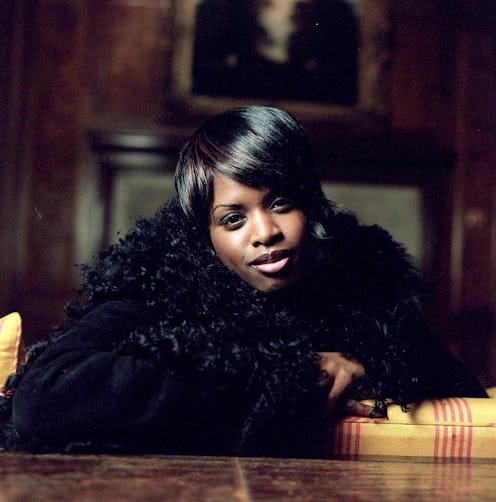Life
6 Talented AF Women That Helped Me Find Pride In Growing Up Black & British

Growing up in London as a black British girl with Jamaican and Cuban ancestry, I have been privileged enough to experience the meshing of two cultures throughout my life. From the blend of Caribbean and British food that makes up my perfect Sunday lunch to the unrivalled elation I feel knowing I can support two countries at any one Olympic Games, I have loved having more than one culture to call my own. (Because you know when Team GB and Team Jamaica are competing in the athletics, I'm wearing those two badges with pride.)
Having said that, I also grappled with my identity growing up. My first memory of feeling slightly on the periphery is from the age of around seven or eight, when more and more of my white peers began asking me why the colour of my skin was different from theirs.
As I grew older, the difficulties around my identity continued. I found myself severely underrepresented in a number of important industries, which made it hard for me to identify with the people others saw as inspirational figures.
Luckily, however, I found solace in a handful of black women in the British media. These were the women that made me feel seen — finally. They sparked a confidence in me that I hadn't felt before, and they made me feel part of a sisterhood (despite not knowing them personally).
I remember hearing Spike Lee say, "You want to see yourself reflected truthfully, as a child." That comment stuck has with me, and I have begun to realise that it is these women who did exactly that for me. They shaped me into the woman I have become; allowing me, for the first time, to see me.
1Angellica Bell
Angellica Bell was one of the first women I saw on screen who looked and spoke just like me. Bell was a presenter on CBBC from 2000 to 2006, and she fronted shows such as Xchange, 50/50, and The Saturday Show. Seeing Bell was a revelation, because it felt like seeing me. As a black British woman in the media, at a time when so few were around, she showed me that I could do it all. She taught me the meaning of black girl magic long before I knew what it was.
2Freema Agyeman
In 2006, Doctor Who was in it's 43rd year and Freema Agyeman sent shockwaves around the world after it was announced that she would play the Doctor's first black companion. When Agyeman took on this iconic TV role, she took on what was previously unchartered territory, by showing my demographic in a whole new light. Agyeman's portrayal of Martha Jones as a medical student was so far away from the hurtful media stereotypes of the angry black woman or the black youth hoodlum.
3Miquita Oliver
Miquita Oliver was one of the 'it' girls of the noughties, fronting T4, Popworld, and even hosting her own shows Miquita Does and The Month With Miquita. Oliver's cool and classy demeanour quickly made me identify with her, and helped me realise my dream of becoming a presenter and broadcast journalist.
4June Sarpong
Presenter extraordinaire June Sarpong's presence on my TV screen immediately made my world more inclusive. I had the pleasure of meeting her on a beach in Ocho Rios, Jamaica, with my grandparents when I was ten, and she asked me what I wanted to be when I grew up. I replied: "On TV, a presenter, like you." Sarpong told me that I could do anything I put my mind to, while reminding me the importance of focusing on my studies. I know for a fact that, without her, I would have never had such big aspirations for my future, and I'll never forget the moment I met her. On top of that (as if I could adore her any more), in 2017 she released a book called Diversify, which argues the benefits of diversity, and in 2018, she released The Power of Women. Seriously, a true icon.
5Sephy from 'Noughts and Crosses'
I have never identified more with a fictional character than Malorie Blackman's Sephy. Blackman included black characters in all her books, and, growing up in a predominately white area and school, I was shaped by her stories in ways I don't have the words to express. Trawling through characters in school books and not seeing any that represented me in the way I wanted meant that I became disillusioned. Jane Eyre's Bertha Mason, "the mad woman in the attic" wasn't exactly how I wanted to be seen. But Sephy was different. She came from a wealthy family, she was strong, brave, pretty, and everything I saw in myself. In fact I identified so much with the character that I emailed Malorie Blackman three times begging her to tell me when there would be a film of Noughts and Crosses so I could be cast as Sephy. Extra, I know. But I guess that character really spoke to me.
6Desmond's
OK, this one's a little different. While the formidable women I've mentioned above showed me where I was going, this iconic TV show showed me where I was from. Desmond's was set in Peckham — just a stone's throw away my native Dulwich, and it was about a Caribbean family who had moved to London and set up a successful barber shop. This show was revolutionary because, although Desmond's children in the show spoke with English accents, Desmond, his wife Shirley, and his best friend Porkpie all spoke with Caribbean accents. It gave me huge amounts of comfort to hear, for the first time, people on television who spoke with the same accents as my grandparents. This representation of my family's culture allowed me, as a child, to see myself the way I wanted to be seen.